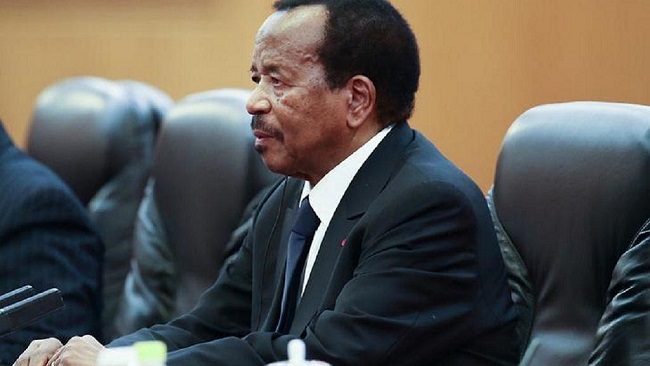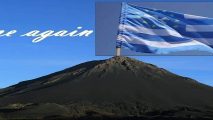9, August 2019
Yaounde-Malabo Tension: Ailing Biya orders army to be on the alert 0
Cameroon has instructed its military to be on the alert as Equatorial Guinea says it is building a border wall to stop Cameroonians and West Africans from illegally entering its territory. Equatorial Guinea’s announcement comes as officials of the Central African Economic and Monetary Community (CEMAC) regional economic bloc, of which Equatorial Guinea is a member, are encouraging the free movement of people and goods to boost economic growth in the region.
Thirty-two-year old Cameroonian merchant Kome Pascal imports wine from Equatorial Guinea. He also exports cement, roofing sheets and farm produce from Cameroon to the neighboring nation.
“I feel very bad because goods will not come again into Cameroon and farmers who sell in Equatorial Guinea, what do they expect them to do with their goods,” he told VOA. “Building that particular wall is not going to permit Cameroonians to sell their goods.”
When Equatorial Guinea said it was building the wall and erected milestones on the border near the Cameroon town of Kye-Ossi, Cameroon army chief Lieutenant General Rene Claude Meka visited the border. Meka said he was told the neighboring state was not respecting territorial limits and was encroaching on Cameroon land. He said the Cameroonian army would not tolerate any unlawful intrusion.
Anastasio Asumu Mum Munoz, Equatorial Guinea ambassador to Cameroon, was called up by Cameroon’s minister of external relations on Thursday to explain his country’s plans for the border.
Ambassador Munoz said his country plans to build a wall, but that reports that the its military had installed milestones in Cameroon territory are misleading.
Equatorial Guinea has always accused Cameroon of letting its citizens and West Africans enter its territory illegally.
More than 100 migrants from Togo, Burkina Faso, Nigeria and Benin on their way to Equatorial Guinea and Gabon are currently stranded in Cameroon after they were rescued from their capsizing vessel in the Atlantic Ocean.
Cameroonian-born Christian Mbock, visiting lecturer of international relations at the National University of Equatorial Guinea, said the wall will stop illegal migrants and secure Equatorial Guinea.
“There was a problem in Equatorial Guinea because there was a coup there, then the government had to protect itself and said that the government was suspending the implementation of [CEMAC’s decision for free movement],” he said. “It is a complex situation.”
Equatorial Guinea has often sealed its border with Cameroon, complaining of security threats posed by illegal immigration.
In December 2017, Equatorial Guinea said it had arrested 30 foreign armed men from Chad, the Central African Republic and Sudan on the border. The report said they possessed rocket launchers, rifles and a stockpile of ammunition to destabilize the government of President Theodoro Obiang, who has led oil-rich Equatorial Guinea since 1979.
Cameroon said it also arrested 40 heavily-armed men on the 290-kilometer boundary.
Both countries are members of the CEMAC, which in 2017 said it had reached a milestone when heads of state meeting in Chad lifted visa requirements for their 45 million citizens traveling within the six-member nation economic bloc.
Source: VOA
































9, August 2019
Biya and his gang have spent at least $940,027 on lobbying in US since the start of 2017 0
President Paul Biya’s government has hired Clout Public Affairs, a firm organised by former aides to Texas Republican Sen. Ted Cruz, to lobby President Donald Trump and US Congress for $55,000 a month.
The contract signed in July will be in four-month increments until it is cancelled, according to public disclosure filings with the U.S. Justice Department.
Foreign Policy magazine reported that the firm, according to the contract, will provide public relations services to help cultivate a “favourable image” for Cameroon’s government, to include “placing targeted op eds in conservative-oriented outlets in order to foster a robust and growing partnership narrative into the future.”
The Clout spokesperson said it is an important time to strengthen ties between the U.S. and Cameroonian governments as the country faces growing instability and threats from terrorism. The lobbying contract does not mention work beyond PR and communications.
But it has drawn sharp criticism from human rights activists, especially after it hired U.S. President Donald Trump’s former acting attorney general, Matthew Whitaker, as its managing director.
Whitaker, who is joining Clout Public Affairs as managing director, will not be working directly on the contract with the government of Cameroon and will not be filing as a lobbyist, a Clout Public Affairs spokesperson told Foreign Policy.
Cameroon’s government has spent at least $940,027 on lobbying and PR work in the United States since the start of 2017, according to Anna Massoglia, a researcher who works on the Foreign Lobby Watch project at the Center for Responsive Politics (CRP).
Cameroon also maintains a lobbying agreement with the global law firm Squire Patton Boggs.) Tracking public disclosure filings under the Foreign Agents Registration Act (FARA),
Massoglia estimates that this puts Cameroon 10th among African countries when it comes to expenditures to U.S. PR firms during that window.
Cameroon’s lobbying contract also represents the latest in a growing list of African governments pouring money into lobbying firms to carve out more influence in Washington under Trump, whose surrogates and campaign affiliates have cashed in on lobbying for foreign governments, catching the attention of human rights advocates and public transparency watchdogs.
“Over the past several years, there has been a hugely significant increase in the number of U.S. lobbyists representing foreign nationals, many of them connected to the Trump administration,” said Jeffrey Smith, the executive director of Vanguard Africa, which supports democracy movements in the region.
“Many of Trump’s fundraisers and supporters have struck it rich in this sector, often working on behalf of the world’s worst human rights abusers,” said Smith, who has done work on behalf of Cameroonian opposition figures. He cited Zimbabwe, which hired the Trump-linked lobbying group Ballard Partners in a bid to scrap long-standing U.S. sanctions, as well as Clout’s work for Cameroon.
Liberia outspent its next closest rival more than seven times over, with FARA records indicating that the country has spent more than $72 million in foreign influence work.
Niger’s spending in the same period totalled just $6,000, according to CRP data.
The Democratic Republic of the Congo has funneled more than $10 million into lobbyists, while a powerful military figure in Sudan’s ruling military junta, Gen. Mohamed “Hemeti” Hamdan Dagalo, hired a Canadian lobbying firm for $6 million to promote his interests with the U.S., Russian, and wealthy Persian Gulf governments.
South Sudan’s government, also implicated in war crimes and widespread corruption, has drawn criticism for hiring former U.S. diplomats to lobby on its behalf for $3.7 million to boost ties with the Trump administration.
Source: Foreign Policy